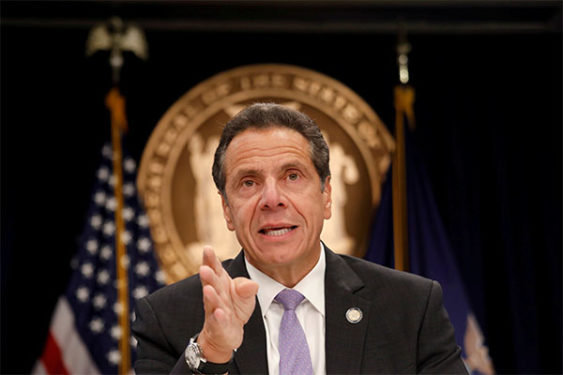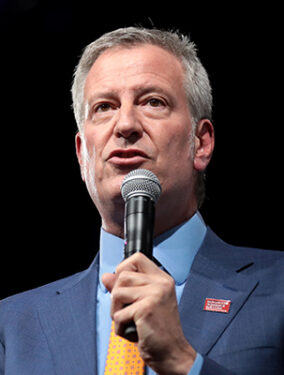
WINDSOR TERRACE — Executive orders give presidents, governors, and mayors the power to suspend certain laws during an emergency — like the COVID-19 pandemic — but opinions on whether that’s good, frequently depend on politics and opinions from both sides of the aisle.
In New York, Gov. Andrew Cuomo’s executive orders are often targeted by Republicans who accuse him of overreach.
On Sunday, Cuomo criticized President Donald Trump’s proposed executive order to boost pandemic unemployment benefits by $400, with $100 kicked in by states. The governor said the 25 percent feed from states would be “simply impossible.”
“One minute he’s crying for federal unemployment assistance and the next day he’s criticizing the president for coming up with a plan,” said New York City Councilman Joseph Borelli of Staten Island of Cuomo.
Borelli is a Republican who represents Staten Island’s south shore.
“The governor is chiding the president for acting without Congress,” Borelli told The Tablet, “while he’s demanding the State Legislature to continue his emergency powers under the pandemic. It’s literally, ‘Do as I say, not as I do.’
“Businesses will close just because the governor can’t let go of theatrics that keeps him in the center of national attention on the pandemic.”
The Legislature voted in March to give Cuomo the power to suspend certain laws by executive order. Included were orders to shutter non-essential businesses and schools, and for every New York to wear protective masks in public.
Last week, Cuomo and New York City Mayor Bill de Blasio signed executive orders extending their emergency powers, but critics say it’s time to end the added authority pointing out that Cuomo’s enhanced authority is no longer needed because statewide coronavirus deaths have dropped significantly.
Watchdog groups — Common Cause NY, the League of Women Voters, Reinvent Albany, and the New York Public Interest Research Group — have called upon Cuomo to give back the power and help the Legislature handle urgent matters, like improving the absentee voting process for the upcoming election.
In a joint statement, they said, “We urge that the powers of the governor be limited to a specific period of time, and only extended as the result of legislative approval by the Legislature. It must not be ‘automatic.’ ”
Clergy also have complaints, saying some orders unfairly target their ministries.
The Democrat governor has shrugged off calls to let go of the emergency powers.
“If the executive orders go away,” he said at a coronavirus press briefing in May, “you know what that means? You don’t have to wear a mask, you don’t have to socially distance.
“Everything that we have done that has worked goes away immediately because they were all done by executive order. So, it’s a stupid idea.”
Republican lawmakers say the temporary emergency power can erode accountability between the branches of state government. GOP senators twice offered amendments to void the extra power, Democrats withheld support, and the measures failed.
Cuomo has extended the emergency powers each month since March. As of last week, he has acted 56 times to suspend laws. The latest extension lasts until Sept. 4. Still, critics noted state law allows him to keep doing that through April 2021.
Also last week, Cuomo signed into law an extension of the “look-back” window that lets accusers file claims under the Child Victims Act, no matter when the abuse allegedly happened. Another executive order he signed May 8 stretched the window from August 2020 to Jan. 14, 2021, but the bill signed last week pushed the deadline to Aug. 14, 2021.
Cuomo said the extensions were needed because the pandemic forced courthouse closings all over the state, preventing all legal filings.
“We cannot let this pandemic limit the ability for survivors to have their day in court,” he said in a news release. “Extending the look-back window is the right thing to do and will help ensure that abusers and those who enabled them are held accountable.”
The governor drew criticism for a directive from the state’s health department in March that required nursing homes to admit residents returning from COVID-19 hospital stays. Two months later, he issued an executive order blocking hospitals from discharging patients to nursing homes unless they test negative for the disease.
As of Aug. 7, health department data shows more than 6,606 COVID-19 patients died or are presumed to have died in New York nursing homes or adult care facilities.
Meanwhile, in New York City, de Blasio confirmed his administration bypassed the normal permit process when it approved Black Lives Matter street murals in all five boroughs. The move rankled other groups who claim their First Amendment rights suffered by not getting the same treatment.

In an Aug. 3 briefing, the mayor said the BLM message “transcends all normal realities because we are in a moment of history where this had to be said and done.”
“That’s a decision I made,” he concluded, “but the normal process continues for anyone who wants to apply.”
John Q. Barrett, a law professor at St. John’s University, explained that political power typically is split between legislative bodies and executives — two of the three branches of government — as set out in their respective constitutions.
This system is used for state and federal governments. A city government does not operate by a constitution but by a charter that must be approved by the state, Barrett said.
But in power disputes involving city, state, or federal governments, attention shifts to the third branch of government — the legal system.
“There are lots of examples of people in the executive branches trying to do things until someone tries to stop them,” Barrett said. “People might say, ‘You can’t appropriate those funds,’ or ‘You can’t run that business.’
“So maybe a lawsuit develops. The courts’ job is to decide that case.”
For example, Cuomo and de Blasio have been sued by clergy, including two Catholic priests from New York’s North Country Region and three Orthodox Jewish residents of Brooklyn.
These plaintiffs claim they had to limit the sizes of religious gatherings to comply with executive orders. In contrast, they add, the governor and mayor supported protests against police brutality while demonstrators ignored social-distancing rules.
U.S. District Judge Gary Sharpe in July issued a preliminary injunction against caps on religious gatherings. He wrote that judges shouldn’t second guess the governor or mayor as they try to fight a pandemic but an exception is: “when those decisions result in the curtailment of fundamental rights without compelling justification.”
Barrett also noted that voters have the most crucial responsibility in the process of government oversight.
“We tend to think of checks and balances as the three branches of government,” Barrett said, “but elected officials — they represent us, and if we’re not happy with their performances, we won’t return them to office.
“So, ‘We the People’ are the ultimate participants in the checks-and-balances process.”
